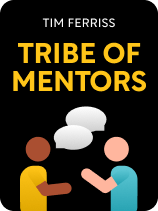

This article is an excerpt from the Shortform book guide to "Tribe of Mentors" by Tim Ferriss. Shortform has the world's best summaries and analyses of books you should be reading.
Like this article? Sign up for a free trial here.
Where’s that sweet spot between pushing yourself to achieve and being too hard on yourself? How might you bring more lightheartedness into your self-discipline?
In Tribe of Mentors, Tim Ferriss shares advice from scores of experts in various fields on how to identify what matters most to you, how to navigate non-traditional career paths, how to appreciate failure, and more. Some of the counsel is about being kind to yourself in the process of pursuing your goals.
Read more for advice on how to go easy on yourself and stop worrying that you’re not smashing all expectations perfectly.
How to Go Easy on Yourself
While you may feel pressured to follow all the book’s advice to the letter, many of Ferriss’s experts acknowledge that this is an extremely difficult task. Be kind to yourself and don’t feel the need to try too hard, these experts counsel.
The first piece of advice on how to go easy on yourself comes from activist and businesswoman Muna AbuSulayman. She asserts that it’s natural to feel like you have to be perfect and achieve wild success in every area of your life every day. However, this unrealistic expectation will cause you to suffer. Instead, try your best, and then quit worrying. This peaceful acceptance of any outcome helps you enjoy life and ensures that instead of getting discouraged and quitting if things don’t go to plan, you’ll be happy to try your best again next time.
(Shortform note: You may worry that practicing self-acceptance by embracing your imperfections and taking it easy will prevent you from pushing yourself to your full potential. Not necessarily: In The Happiness Advantage, Shawn Achor argues that self-acceptance makes you feel happier, and happier people are more productive and therefore enjoy greater professional success. One reason for this is that the neurochemicals your brain releases when you’re happy also make it easier for you to think quickly and creatively, solve problems, and learn new ideas.)
Filmmaker Robert Rodriguez argues that it’s possible to maintain a playful mindset even in the most stressful situations. When Rodriguez faces tasks that seem impossible to accomplish with the time and resources he has, he makes it a habit to loudly proclaim “Fácil!”—Spanish for “easy”—to everyone around him. This mantra is half-joking and half-serious. It helps Rodriguez and his collaborators maintain a sense of humor as they work and gives them the optimism they need to accomplish much more than they thought was possible.
(Shortform note: Even if you don’t feel enthusiastic during stressful situations, repeatedly acting as if you are may make it easier to turn stress into excitement in the future. According to a psychological theory called the Hebbian Principle, when two parts of the brain activate simultaneously, they form a connection: In the future, when one activates, the other will, too. This means that if you make yourself feel excited whenever you’re in a high-pressure situation, similar situations later will automatically make you feel excited. Acting enthusiastic activates the same parts of your brain as actually feeling enthusiastic, so you can form these neural connections just by pretending.)

———End of Preview———
Like what you just read? Read the rest of the world's best book summary and analysis of Tim Ferriss's "Tribe of Mentors" at Shortform.
Here's what you'll find in our full Tribe of Mentors summary:
- Distilled life advice from over 130 world-class experts in various fields
- How to navigate non-traditional career paths, appreciate failure, and more
- Why you should allow a small amount of measured chaos in your schedule






